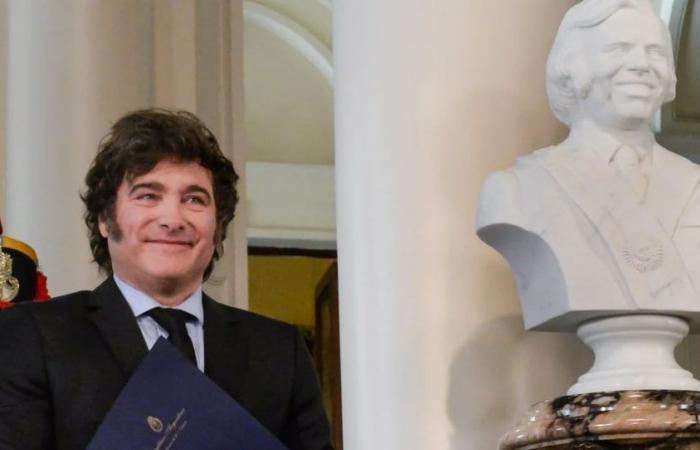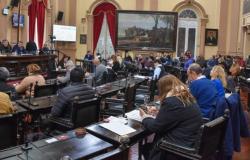
If there are no changes of direction in the Ministry of Economy, Argentine society will face in the coming months the highest electricity and gas rates in the last 30 years. In relation to the pocket salary, the costs of services will no longer exceed not only the adjustment of the government of Mauricio Macribut that of the mandate of Carlos Menemthe period in which President Javier Milei likes to reflect.
After the devaluation December, the draconian cuts in the public spending and the approval of the Base Law In the Senate, the tariff issue will be the next post that will challenge the Government’s powerful narrative. The voters of La Libertad Avanza (LLA) have supported the economic shock measures until now, but the delayed increase in services will add tension to the chosen course.
The consulting firms Economía & Energy, of Nicolas Arceoand PxQ, from Emmanuel Alvarez Agisthey estimated at a recent report the impact of tariffs on public services. According to this analysis, high-income users (N1) had to allocate 6.4% of their salary in June to pay energy bills, middle-income users (N3) had to allocate 4.1% and low-income users (N2) in June. 4.8 percent. These are calculations that exceed the energy cost achieved by previous governments, from a historical series that begins in 1994.
There’s a volatile electorate and pragmatic that accompanies the “libertarian laboratory” in the open, and that does not necessarily pay absolute loyalty to the Government. After six months of sustained income loss, it is unknown how Milei voters will perceive the payment of electricity bills over $35,308which is the value of the average bill projected by Agis and Arceo for sectors of lower socioeconomic level. These tickets will begin to be common currency.
The exhaustive 48-page analysis, titled “Milei’s moderate voter: between hope and sacrifice”, published by the foundation Friedrich Ebert Stiftung, reflects some elements of this segment, which is in the middle of the consolidated groups of the official hard core, and the opposition voter who rejects absolutely everything that comes from the Casa Rosada. The study exposes characteristics present in adhering to the Milei project, and the contradictions that will appear to the extent that there is no material improvement in that support base.
“We decided to work with the moderate voter, the one who did not vote in the first round and did vote in the runoff. This voter has certain agreements and distances with the Government. One of these distances is the weight of the adjustment on the middle classes, retirees and popular sectors. There is a more ambivalent view of support for Milei, and many understand that the adjustment falls on them, and not on ‘the caste’. The increase in rates reinforces, in some way, that perception“, the consultant told Infobae Pablo Romaone of the authors of the report.
The study, prepared in conjunction with the researchers Esther Solano and Thais Pavez, hypothesizes that a possible economic failure of Milei “does not mean a failure from an ideological point of view.” In this view, support for the unpopular measures taken by the Government is based on moral ideas or principles that have social accompanimentlike the idea of sacrifice, hope and individual merit.
“It is true that the moderate voter is the idea of a sacrifice that you have to face things that were ‘very bad’, and that to fix them a period of suffering is necessary. I think that the Government’s speech works well on that perception,” said Pablo Romá.
According to this analysis, moderates who support Milei are divided between the “hopeful” and the “ambivalent””. Among the hopeful, the aforementioned idea of sacrifice prevails, and the belief in the personal characteristics of a firm Milei, prepared and concerned for the people. It is among the ambivalents where feelings of uncertainty and disappointment have been appearing for months, despite the fact that they still maintain support.
“What is the time for that sacrifice? It varies a lot, it’s difficult to measure. They are political processes in which different issues are at stake that are not only chronological. There is a situation that is contradictory, because the same people who support are the ones who suffer the weight of the adjustment,” Romá pointed out.
The tariff adjustment is a watershed in the political and economic governance of the last 20 years. In Kirchnerism, it was the beginning of tensions in the external trade balance, which required a huge import of fossil fuels and greater expenditure of public spending on subsidies.
In the case of Mauricio Macri, was the first obstacle he faced in 2016 at the beginning of his administration, with an adverse ruling from the Supreme Court that limited increases in electricity and gas bills. And it was in fact the first break with his voter base. A year later, he regained this support with victory in the legislative elections.
From the perspective of governance, an increase in energy costs is a sensitive fiber for the sustainability of the productive apparatus, which is already in check by the recession and the drop in installed capacity. Several of the historical crises in countries and globally are associated with structural changes in the price of energy and fuels.
In this framework, households find themselves with less backbone to face higher expenses after the combination of the “chainsaw” and the “blender”. The consultant Moiguer, based on a survey of 1,300 people, indicated that 55% of those consulted declared that they have debts (10% more than in 2023), and 56% had to use savings to pay daily budget expenses. 72% answered that their income is below the inflation of recent months.
From a historical perspective, the impact of tariffs on salaries places Javier Milei once again in an image that is mirrored by the government of Carlos Menem. The President is interested in drawing these parallels, and even surpassing one of his references. On his trip to Spain, Milei once again stated that his reform of the State, including the Bases Law and the mega DNU, is “eight times bigger” than that of the former Justicialist president.
In everyday life, most of the population is not involved in these comparisons. Yes, it is a “metié” of intellectual debates and red circles. “The historical perspective is not so present. There is a view focused on the present, on the erosion of traditional politics and on the role of the State as a factor that distorts the possibilities of growth, of a State that prevents growth,” Romá concluded about the moderate voter.
The consultant Isasi-Burdman provided another striking piece of information about economic expectations. The perception that the economy will improve in 2024 had a slight rise in June, and went from 29% to 32% among those surveyed. While the perception improved in adults over 35 years of age, pessimism is beginning to appear in young people under 35 years of age, one of the core of Milei voters. According to this survey, this segment is the most pessimistic regarding the future, after rising from 49 to 60 percent.
In this context of oscillations in opinion, the population will go through the next stage of adjustment, with harsh increases of 400% in electricity bills, and increases of more than 1000% for natural gas through networks in the Metropolitan Area of Buenos Aires ( AMBA).
The Government’s “cultural battle” to achieve political acceptance of these measures is not purely discursive. The Italian socialist, Antonio Gramsci –that the President once cited as a strategy to replicate– said that economic reform programs are “precisely the concrete way of presenting any intellectual or moral reform”.





